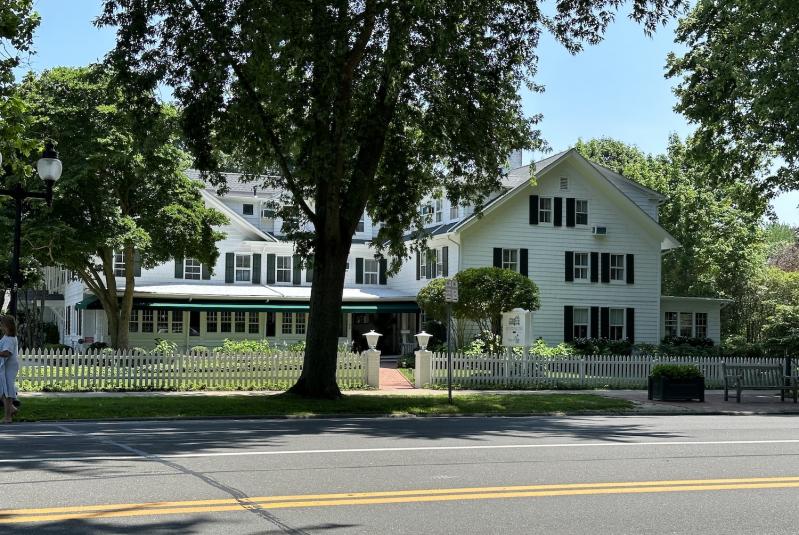After two and a half years in front of the East Hampton Village Zoning Board of Appeals, a time full of amended site plans, hearings, adjourned hearings, arguments, and plenty of neighbor opposition, the Huntting Inn’s quest for a pool and other improvements may fail. The reason? The Z.B.A. may not have the authority to grant the approval, even if it saw fit to do so, because of a rarely referenced section of village code.
Martha Reichert, the attorney for Landry’s Inc., a national hospitality group that owns the inn, was asked by the Z.B.A. after a May hearing to address a comment from a neighbor, Lisa Dortch. In a letter to the board, Ms. Dortch had written, “The code states no variance shall be granted to permit the introduction of any outdoor use, including outdoor dining, to a pre-existing commercial use in a residential district. Subsequently, there can be no way a pool or a spa, which expands outdoor use, can be permitted by this board if the board is ruling in accordance with village code.”
“This had been a threshold issue that had been raised very early on, discussed, addressed in our initial application submission and sort of laid to rest,” Ms. Reichert told the board. Nonetheless, as requested, she drafted a memorandum of law, 45 pages, scouring the history to find when the code had been used in the past. “In a nutshell, this code was enacted in 2014 and only came before this board specifically once.” She argued that in the past when variances had been requested by commercial properties in a residential district, as long as they were accessory to the business requesting them, they had been granted. A pool is accessory to operating an inn, she said.
The pool has received steadfast opposition from neighbors, no matter that it was to be fully screened, its hours restricted, and its size trimmed from earlier applications. Meanwhile, a three-story elevator shaft (there is no elevator in the circa-1699 inn) added ostensibly to allow for the disabled to access each floor of the building (including a new second floor Americans with Disabilities Act-approved suite), redesigned walkways, entry ramps, new patios, and other interior changes have received less heat. One neighbor even said that the application was putting “the swimming pool in an A.D.A. wrapper.”
In her memorandum, Ms. Reichert weighed in heavily on a settlement relating to another historic village inn, the Hedges, from December 2021, only months before the Huntting Inn application. “One of the things that the parties sought in settling was to confirm the application of this particular section of the code and how to interpret it with respect to a swimming pool at the Hedges Inn,” she told the board. She read the stipulation. “No use variances shall be required for construction of the pool as the pool is deemed a permanent accessory use to the inn.” Further, the stipulation of settlement specifically cited the code section in question and said that it couldn’t be used to prohibit the inn from obtaining a variance for a pool.
“I would say that this is clear legislative intent that confirms that a swimming pool, even at a historic inn, is a pertinent accessory and any proposed pool, and in this case, a spa and its associated patio, would not be prohibited from applying for and obtaining variances,” she said. She argued that the Huntting Inn therefore couldn’t be treated differently than the Hedges, and that the court of appeals wouldn’t look kindly on the board reaching a different result when the facts of the case were essentially the same.
“Nothing in the village code would prevent this board from considering the variance,” she concluded.
Timothy Hill, the village attorney for the Z.B.A., saw it differently. “Upon a close consideration of this provision of village code, the application of its plain language simply does not confer authority for this board to grant those portions of this application that would involve the introduction of an outdoor use. It’s simply a bar to its authority to grant that.” He told the board the legal stipulation that related to the Hedges Inn litigation was specific only to that case and “doesn’t establish a precedent.”
In other words, granting a variance to allow the pool was, indeed, beyond the Z.B.A.’s authority.
Mr. Hill’s statement set up the very real possibility that when the board rules on the application it may approve or disapprove only the changes to the interior of the inn and set aside judgement on the controversial pool. John McGuirk, the board chairman, hinted strongly that the board would close the record at the October meeting and vote on the application soon after.
If the Z.B.A. rules against the pool, it appears Ms. Reichert has done plenty of research arming Landry’s for a future legal battle.




